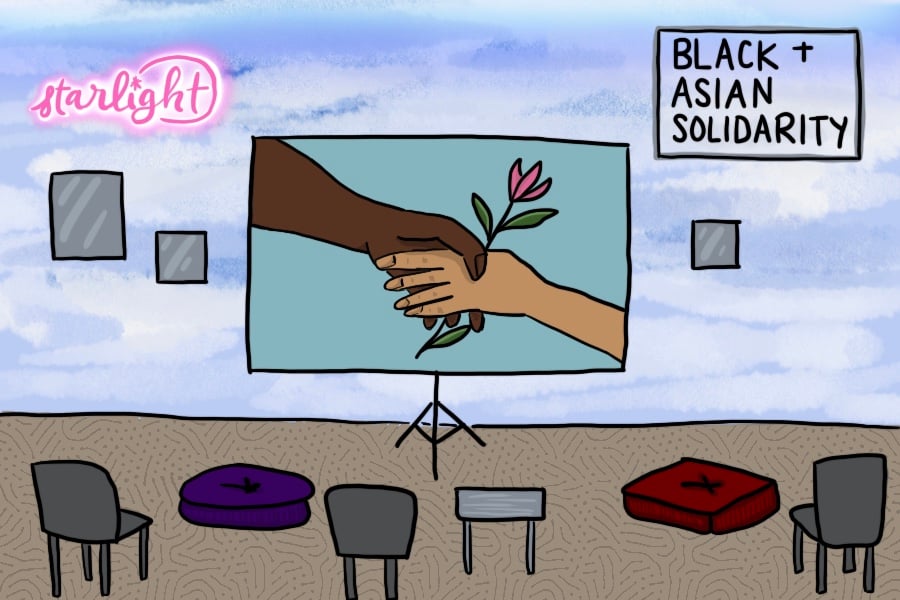Aqil Brothers showcase intersectional music at starlight Space
Illustration by Eliana Storkamp
“starlight” is a new community arts space and workshop established in collaboration with the Northwestern’s Race Caste and Colorism Project.
November 10, 2022
Almost 30 spectators gathered on Devon Avenue last month to hear the Aqil Brothers perform as part of the SpaceShift Collective’s Race, Caste and Colorism project.
The Bangladeshi band — made up of brothers Shamim Aqil and Mohammed Mithu, and their father, Abdul Mannan — are among many artists and activists taking advantage of the collective’s new arts space and workshop.
The collective, dubbed “starlight,” hosted the space and programming through the end of October. Established in collaboration with the Race, Caste and Colorism Project at Northwestern’s Buffett Institute for Global Affairs, the space works to research and celebrate solidarity between Black and South Asian communities.
Soumya Rachel Shailendra, a starlight research assistant, said the initiative aims to bring artists, activists and Chicago-area residents together at its Devon Avenue space.
“We think about the ways the artist… and the people have free and open access to come in at any time,” Shailendra said. “What does that do for relationality, and how we connect to each other?”
For the Aqil Brothers, a Bangladeshi band audience connection was the most important aspect of their performance Saturday.
Aqil said he enjoyed sharing his and his family’s history with the crowd. He’s always been musically inclined, he said, but he never thought he would grow up to play with his father, who pursued music in Bangladesh.
“I think music runs in our family, in our blood,” Aqil said. “But initially, I wasn’t as interested in music when I was a kid. I was more into hip-hop and trying to fit into the culture around me.”
As he grew older, Aqil said he began to realize and appreciate his father’s gift and the strength of his music. The family moved from Bangladesh when Aqil was just 12 years old, and he said music has been a way for him to stay connected to his family and culture.
The group performs in Hindi and Bengali, sometimes adapting a song from one language to the other. Aqil said this kind of intersectional performance is at the heart of what the band does.
“It brings us closer as a community,” Aqil said. “There are other members of the community who probably never would have heard of us, and other people from other cultures now hear us because of this.”
Aqil said starlight’s mission fits with the band’s goals of sharing their music and culture. He added that he has also learned about other cultures and their musical forms through starlight’s space.
According to Asian Languages and Cultures Prof. Laura Brueck, who is a co-director of the Race, Caste and Colorism project, the initiative hopes to create a network of scholars, artists and activists like the Aqil Brothers.
“We’re interested in working to create…opportunities for solidarity building and mutual inspiration across resistance movements,” she said.
Aqil added that the experience has also been one of reclamation for him and his family. When Mannan first moved to the United States, he was not able to find a harmonium, a classic Bengali instrument. Instead, he used a child’s keyboard to play traditional music.
Now, the group has been able to share instruments native to their home with audiences at starlight. During the performance, Aqil beat a dhak, a drum made of mango skin.
“We learn from each other,” he said. “When I come here, I see Afghan musicians … I see people from Africa coming here playing African music. I would have never been able to see that. I learned more about the other cultures by coming here.”
Katrina Pham contributed reporting.
Email: avanikalra2025@u.northwestern.edu
Twitter: @avanidkalra
Related Stories:
— SpaceShift Collective starlight space shines a light on artistic forms of resistance
— Spice shop Inspired Indian Cooking connects culture and community through cooking



